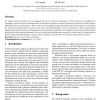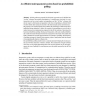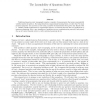177 search results - page 22 / 36 » Trusted Computing, Trusted Third Parties, and Verified Commu... |
SAJ
2002
13 years 7 months ago
2002
No reliable method currently exists to safeguard the privacy of private information. Privacy policies are insufficient as compliance can not be enforced automatically. In this pap...
PERCOM
2009
ACM
14 years 2 months ago
2009
ACM
—Ensuring spontaneous ad hoc interoperation in decentralized ubiquitous computing environments is challenging, because of heterogeneous resources and divergent policies. Centrali...
FC
1997
Springer
13 years 11 months ago
1997
Springer
Existing software proposals for electronic payments can be divided into "on-line" schemes that require participation of a trusted party (the bank) in every transaction an...
EDCC
2005
Springer
14 years 1 months ago
2005
Springer
The fair exchange problem is key to trading electronic items in systems of mutually untrusted parties. In modern variants of such systems, each party is equipped with a security mo...
ECCC
2006
13 years 7 months ago
2006
Traditional quantum state tomography requires a number of measurements that grows exponentially with the number of qubits n. But using ideas from computational learning theory, we...



